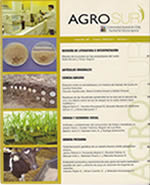Effect of defoliation frequency and nitrogen fertilization on herbage production and nutritive quality of a Lolium perenne L. sward
Main Article Content
Abstract
A study was conducted in Valdivia, Chile, to evaluate changes in dry matter production, nutritional quality, tiller density, leaf area and light interception in a pasture of Lolium perenne L., submitted to different levels of nitrogen (N) fertilization and defoliation frequencies. The N levels used were 0, 75, 150, 300 and 450 kg N ha-1 year-1, applied monthly based on the rate of pasture growth. The defoliation frequency was based on the number of leaves per tiller and corresponded to 2 and 3 fully expanded leaves per tiller. A complete randomized block design with a factorial arrangement of five levels of N and two defoliation frequencies. Nitrogen fertilization had an effect on herbage mass, nutritional quality, tiller density, leaf area and light interception. Biomass production increased as it did the level of N fertilization. For the nutritional parameters, the higher levels on N fertilization increased the dry matter content, the crude protein, the metabolizable energy, the neutral detergent insoluble nitrogen and the soluble protein. The neutral detergent fiber, acid detergent fiber and soluble carbohydrates decreased. Fertilization also favored tiller density, leaf area per tiller and the light intercepted. The frequency of defoliation had no effect on herbage mass, but with higher frequency of defoliation crude protein, the neutral detergent insoluble nitrogen and soluble protein increased, while neutral detergent fiber and acid detergent fiber were higher with a lower frequency of defoliation.

